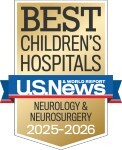About This Clinic
The Tuberous Sclerosis Clinic at the Dell Children’s Neurogenetics Center is a multidisciplinary clinic within UT Health Austin Pediatric Neurosciences at Dell Children’s, a clinical partnership between Dell Children’s Medical Center and UT Health Austin.
Our nationally recognized providers take a patient-centered approach to diagnose and treat children with tuberous sclerosis complex (TSC). With our providers’ decades of experience, collaborative approach, and advanced technology, we provide a wide range of services from diagnosis to disease surveillance and management, surgical treatment, rehabilitation, and more. Our mission is to help your child be as happy, healthy, active, and independent as possible.
The Tuberous Sclerosis Clinic is one of the only tuberous sclerosis clinics in Central Texas. It is also one of the only tuberous sclerosis clinics in Texas designated as a comprehensive TSC Clinic by the TSC Alliance.

Through our clinical partnership with Dell Children's Medical Center, the UT Health Austin Pediatric Neurosciences at Dell Children’s program contributes to Dell Children's national recognition as one of the country's best specialty programs for Neurology and Neurosurgery by U.S. News & World Report in 2025-2026.
Treatment Approach
Tuberous sclerosis complex is a lifelong genetic disease that causes tumors to develop in the body’s organs, most often the kidneys, brain, heart, eyes, skin, and lungs. Although the tumors are not cancerous, they can create serious complications such as seizures, infantile spasms, autism, intellectual disabilities, and developmental disorders. Over 90 percent of children with TSC have seizures (epilepsy), and two-thirds of these cases are resistant to treatment with anti-seizure medications alone.
TSC is caused by mutations in two genes: TSC1 and TSC2. It can be inherited from a parent, but it usually develops before birth from a spontaneous genetic mutation. Because of the young age of onset and its prominent effect on the brain, early detection is crucial for minimizing symptoms and preventing problems like epilepsy and developmental delays.
The Tuberous Sclerosis Clinic care team takes a multidisciplinary approach to treating tuberous sclerosis complex. Our board-certified and fellowship-trained neurologists have extensive experience treating tuberous sclerosis from infancy into adulthood. Depending on your child’s situation, they will coordinate care with other pediatric neuroscience experts, including epileptologists, neurosurgeons, neuropsychologists, neuro-ophthalmologists, physical medicine and rehabilitation specialists, physical and occupational therapists, speech therapists, physiatrists, nurses and nurse practitioners, social workers, child life specialists, and dietitians.
Because TSC affects multiple organs, the Tuberous Sclerosis Clinic care team also coordinates with other specialists, such as dermatologists, urologists, nephrologists, cardiologists, endocrinologists, and pulmonologists, for evaluation and treatment. Our tuberous sclerosis physicians routinely participate in research for improved diagnostics and therapies, allowing us to offer your child the latest care tailored to their needs.
As your child transitions into adulthood, we will continue coordinating their care. By involving your family every step of the way, we’ll improve your child’s physical health, mental health, social health, and overall quality of life.
Appointment Information
For more information about the Tuberous Sclerosis Clinic, please call 1-512-324-0000 ext. 80550. You can also call 1-512-628-1855 for referrals or fax referrals to 1-512-380-7544.
About the Partnership Between UT Health Austin and Dell Children's
The collaboration between UT Health Austin and Dell Children's brings together medical professionals, medical school learners, and researchers who are all part of the integrated mission of transforming healthcare delivery and redesigning the academic health environment to better serve society. This collaboration allows highly specialized providers who are at the forefront of the latest research, diagnostic, and technological developments to build an integrated system of care that is a collaborative resource for clinicians and their patients.